
Sails of Peace. Russian sailboats make way to Antarctica
/ Главная / Russkiy Mir Foundation / Publications / Sails of Peace. Russian sailboats make way to AntarcticaSails of Peace. Russian sailboats make way to Antarctica
The voyage is timed to the 200th anniversary of the discovery of Antarctica by Russian sailors (2020 was officially declared the Year of Antarctica in Russia to celebrate this date), as well as to the 75th anniversary of the Victory in the Great Patriotic War. The expedition route partially repeats the expedition of Faddey Bellinsgauzen and Mikhail Lazarev.
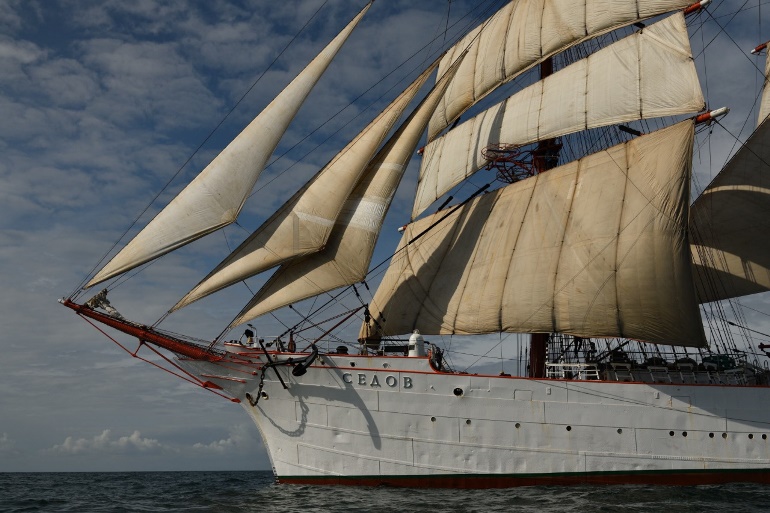
Photo credit: russiansails2020.ru
The southern polar expedition consisting of the sloops Vostok (commanded by Faddey Bellinsgauzen) and Mirny (commanded by Mikhail Lazarev) sailed for long voyage in 1819 from Kronstadt and opened Antarctica on January 28, 1820. The expedition lasted 751 days. The ships sailed over 92 thousand kilometers and returned to Kronstadt in 1821. In addition to Antarctica, the expedition discovered 29 islands and one coral reef. Russian sailors conducted scientific and oceanographic research during the trip.
On November 1, 2019, Pallada will set off from Vladivostok and start its journey around the globe at high latitudes. It will have to travel 27,120 nautical miles and return home on June 9, 2020.
On December 6, Kruzenshtern's voyage starts from Kaliningrad, which will cover 29,011 nautical miles and make the largest number of stops - 25. The sailing ship will return home on September 3, 2020.
Sedov will leave Kronstadt on December 10, 2019 and return to Kaliningrad on December 12, 2020. Its voyage will be the longest - the bark will cover 40,209 nautical miles within a year.
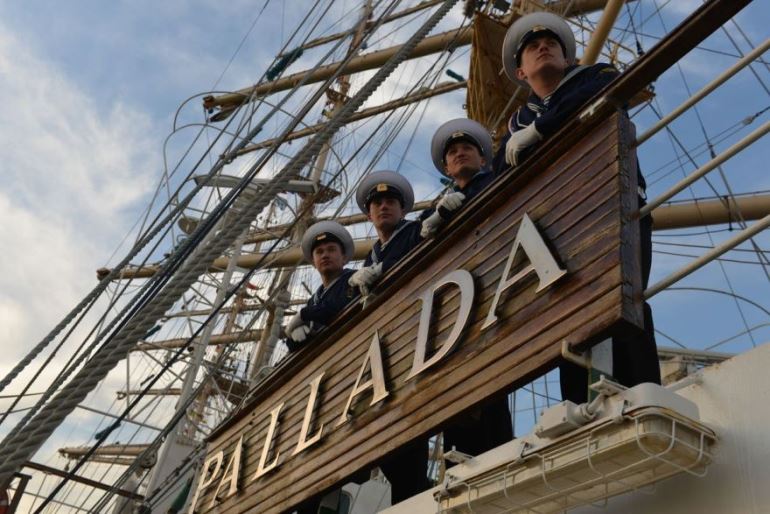
Photo credit: russiansails2020.ru
According to the head of the Federal Fisheries Agency Ilya Shestakov, the uniqueness of this expedition lies in the fact that three sailing vessels will meet at the closest point to Antarctica for the first time in the history. This will happen in February of 2020 in the area of the South Georgia Islands in the Atlantic Ocean (if the weather and ice conditions are suitable). A 200-mile regatta will be held there.
The organizers called this expedition Sails of the World and declared it open. They call on colleagues from other countries to join the trip. Negotiations are already underway with representatives of several countries on sending foreign cadets to Russian vessels — seats are reserved for them. This is done in order to enable young sailors from different countries to get acquainted and feel the team spirit.
The Federal Fisheries Agency assures that all the ships have undergone repairs, have been fit up with modern navigation equipment and are ready for any tests. The ships of the Russian Navy will accompany the expedition in the waters known for frequent pirate raids. In addition, all risks associated with the possible arrest of sailboats due to sanctions are excluded: they will not go to ports of countries that have not given guarantees of the inviolability of ships.
According to the rector of the Kaliningrad State Technical University Vladimir Volkogon, only experienced and academically successful cadets are recruited to the team. In total, about 700 cadets and 60 young students will take part in the expedition.
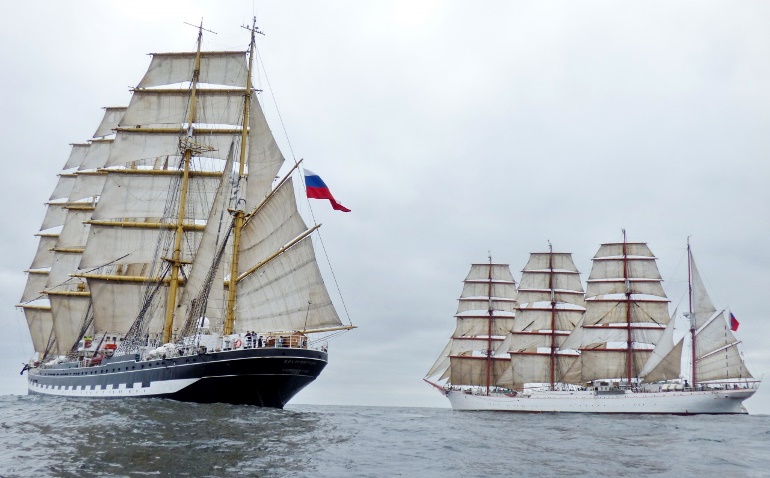
Photo credit: russiansails2020.ru
Ilya Shestakov mentioned that Russian stars and politicians might take part in the expedition and help cadets overcome the difficulties of sailing. According to Vladimir Volkogon, the experience of past expeditions suggests that the most important thing in long-distance navigation is a psychological attitude, since cadets have to spend a long time in a closed environment. For example, crossing the Pacific Ocean takes about two months.
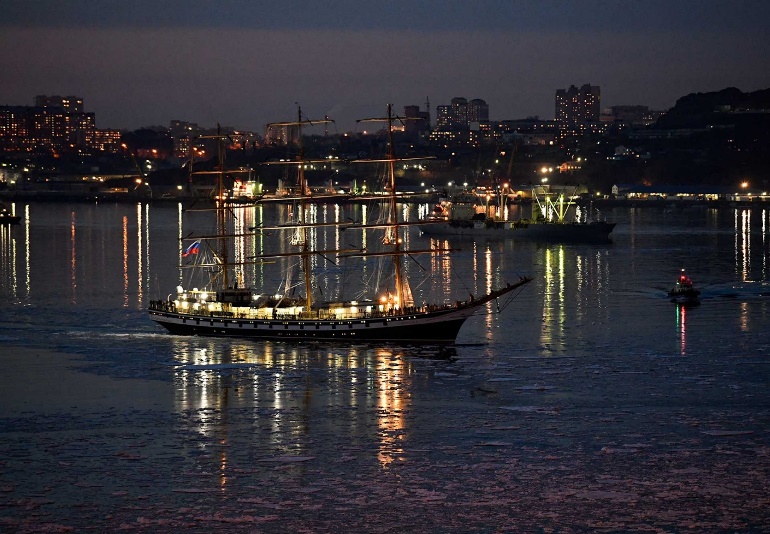
Photo credit: russiansails2020.ru
The main mission of the Sails of the World is to remind of the Russian discoverers of Antarctica and demonstrate the high level of training of our sailors. The cultural task is also set - each port will have an “open board” mode. This means that anyone can visit the Russian sailing ship - good news for our foreign compatriots.
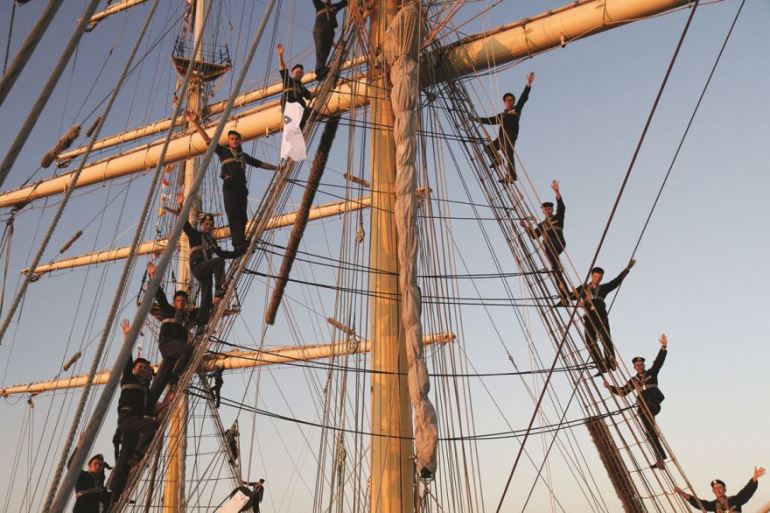
Here is the sailing route and the dates of arrival at the ports:
Pallada
Vladivostok (Russia) - November 1, 2019.
Apia (Samoa) - December 7 - 9, 2019
Papeete (Tahiti) - December 24 - 26, 2019
Valparaiso (Chile) - January 29 - 31, 2020
Ushuaia (Argentina) - February 12 - 14, 2020
Cape Town (South Africa) - March 16 - 18, 2020
Port Louis (Mauritius) - April 7 - 9, 2020
Singapore - May 5 - 7, 2020
Muara (Brunei) - May 13 - 15, 2020
Nagasaki (Japan) - June 2 - 4, 2020
Vladivostok (Russia) - June 9, 2020
Sedov
Kronstadt (Russia) - December 10 - 12, 2019
Las Palmas (Spain) - January 5 - 8, 2020
Montevideo (Uruguay) - February 10 - 14, 2020
Cape Town (South Africa) - March 16 - 18, 2020
Port Louis (Mauritius) - April 5 - 7, 2020
Mumbai (India) - April 26 - 29, 2020
Singapore - May 16-19, 2020
Qingdao (China) - June 6 - 8, 2020
Busan (Korea) - June 12-15, 2020
Vladivostok (Russia) - June 20 - 30, 2020
Nagasaki (Japan) - July 5 - 8, 2020
Pearl Harbor (USA) - August 6 - 9, 2020
San Francisco (USA) - August 25 - 28, 2020
Acapulco (Mexico) - September 11 - 14, 2020
Panama (Panama) - September 25 - 28, 2020
Havana (Cuba) - October 7 - 10, 2020
New York (USA) - October 20 - 23, 2020
St. Johns (Canada) - October 31 - November 3, 2020
Reykjavik (Iceland) - November 14 - 17, 2020
Le Havre (France) - November 27 - 30, 2020
Gdansk (Poland) - October 8 - 11, 2020
Kaliningrad (Russia) - December 12, 2020
Kruzenshtern
Kaliningrad (Russia) - December 6, 2019.
Santa Cruz de Tenerife (Spain) - December 25 - 29, 2019
Rio de Janeiro (Brazil) - January 22 - 25, 2020
Montevideo (Uruguay) - February 1 - 4, 2020
Ushuaia (Argentina) - February 12 - 15, 2020
Las Palmas (Spain) - April 1 - 5, 2020
Casablanca (Morocco) - April 12 - 14, 2020
Haifa (Israel) - April 27 - 29, 2020
Sevastopol (Russia) - May 7 - 11, 2020
Novorossiysk (Russia) - May 16-19, 2020
Sochi (Russia) - May 21-24, 2020
Patras (Greece) - June 2 - 6, 2020
Barcelona (Spain) - June 13-16, 2020
Bordeaux (France) - June 25 - 28, 2020
Le Havre (France) - July 3 - 7, 2020
Brest (France) - July 10-16, 2020
Zeebrugge (Belgium) - July 22-26, 2020
Rostock (Germany) - August 6 - 8, 2020
Amsterdam (Netherlands) - August 12 - 16, 2020
Bremerhaven (Germany) - August 19 - 23, 2020
Swinoujscie (Poland) - August 28 - 31, 2020
Kaliningrad (Russia) - September 3, 2020
Anyone interested in following this expedition will be able to do it on the official website. You can find information about each sailing ship, read news in English and Russian and monitor the position of ships in real time.
New publications

 Mikhail Kalatozov, a director who transformed the world of cinematography in many ways, was born 120 years ago. He was a Soviet film official and a propagandist. Above all, he was capable of producing movies that struck viewers with their power and poetic language.
Mikhail Kalatozov, a director who transformed the world of cinematography in many ways, was born 120 years ago. He was a Soviet film official and a propagandist. Above all, he was capable of producing movies that struck viewers with their power and poetic language.  Ukrainian authorities have launched a persecution campaign against the canonical Ukrainian Orthodox Church (UOC), the biggest one in the country's modern history. Over the past year, state sanctions were imposed on clergy representatives, searches were conducted in churches, clergymen were arrested, criminal cases were initiated, the activity of the UOC was banned in various regions of the country, and monasteries and churches were seized.
Ukrainian authorities have launched a persecution campaign against the canonical Ukrainian Orthodox Church (UOC), the biggest one in the country's modern history. Over the past year, state sanctions were imposed on clergy representatives, searches were conducted in churches, clergymen were arrested, criminal cases were initiated, the activity of the UOC was banned in various regions of the country, and monasteries and churches were seized.  When Nektary Kotlyaroff, a fourth-generation Russian Australian and founder of the Russian Orthodox Choir in Sydney, first visited Russia, the first person he spoke to was a cab driver at the airport. Having heard that Nektariy's ancestors left Russia more than 100 years ago, the driver was astonished, "How come you haven't forgotten the Russian language?" Nektary Kotlyaroff repeated his answer in an interview with the Russkiy Mir. His affinity to the Orthodox Church (many of his ancestors and relatives were priests) and the traditions of a large Russian family brought from Russia helped him to preserve the Russian language.
When Nektary Kotlyaroff, a fourth-generation Russian Australian and founder of the Russian Orthodox Choir in Sydney, first visited Russia, the first person he spoke to was a cab driver at the airport. Having heard that Nektariy's ancestors left Russia more than 100 years ago, the driver was astonished, "How come you haven't forgotten the Russian language?" Nektary Kotlyaroff repeated his answer in an interview with the Russkiy Mir. His affinity to the Orthodox Church (many of his ancestors and relatives were priests) and the traditions of a large Russian family brought from Russia helped him to preserve the Russian language.

 The leaders of the Friends of the Great Russia cultural association (Amici Della Grande Russia) in Italy believe that the Western policy of abolishing Russian culture in Europe has finally failed. Furthermore, it was doomed to failure from the beginning.
The leaders of the Friends of the Great Russia cultural association (Amici Della Grande Russia) in Italy believe that the Western policy of abolishing Russian culture in Europe has finally failed. Furthermore, it was doomed to failure from the beginning.  Name of Vladimir Nemirovich-Danchenko is inscribed in the history of Russian theater along with Konstantin Stanislavski, the other founding father of the Moscow Art Theater. Nevertheless, Mr. Nemirovich-Danchenko was a renowned writer, playwright, and theater teacher even before their famous meeting in the Slavic Bazaar restaurant. Furthermore, it was Mr. Nemirovich-Danchenko who came up with the idea of establishing a new "people's" theater believing that the theater could become a "department of public education."
Name of Vladimir Nemirovich-Danchenko is inscribed in the history of Russian theater along with Konstantin Stanislavski, the other founding father of the Moscow Art Theater. Nevertheless, Mr. Nemirovich-Danchenko was a renowned writer, playwright, and theater teacher even before their famous meeting in the Slavic Bazaar restaurant. Furthermore, it was Mr. Nemirovich-Danchenko who came up with the idea of establishing a new "people's" theater believing that the theater could become a "department of public education."  "Russia is a thing of which the intellect cannot conceive..." by Fyodor Tyutchev are famous among Russians at least. December marks the 220th anniversary of the poet's birth. Yet, he never considered poetry to be his life's mission and was preoccupied with matters of a global scale. Mr.Tyutchev fought his war focusing on relations between Russia and the West, the origins of mutual misunderstanding, and the origins of Russophobia. When you read his works today, it feels as though he saw things coming in a crystal ball...
"Russia is a thing of which the intellect cannot conceive..." by Fyodor Tyutchev are famous among Russians at least. December marks the 220th anniversary of the poet's birth. Yet, he never considered poetry to be his life's mission and was preoccupied with matters of a global scale. Mr.Tyutchev fought his war focusing on relations between Russia and the West, the origins of mutual misunderstanding, and the origins of Russophobia. When you read his works today, it feels as though he saw things coming in a crystal ball...